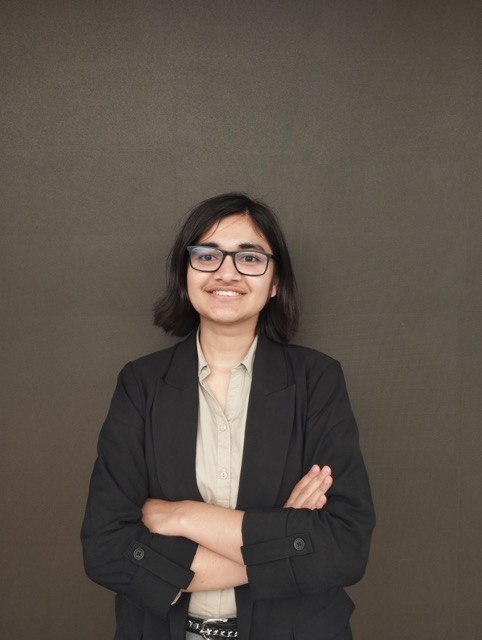
Anan Afrida ’26 is multilingual. A coding contest poster started her journey of talking with the binary machine: the computer. With just the knowledge of programming language C’s “if…else” statement, Afrida wrote her first line of code in the sixth grade. Over the years, she has built upon her vocabulary of syntaxes and algorithmic reasoning, and has advanced to regional, national and international levels of programming competitions, only to find herself the only girl in a room of 50–70 participants. Since then, she has made it her mission to facilitate involvement of more girls in computer science.
“My thought process was, firstly, this has to stop,” Afrida said. “But then again, how do I stop it? I have to maintain my participation. That also motivated me to start this organization for women in Bangladesh, which motivates girls to come into computer science, and specifically competitive coding. I asked [my friends] to go to their schools to have coding sessions, specifically for high school and middle school girls.”
Now, at Wesleyan, far away from her home in Bangladesh, she continues this mission. As the President of Code_Wes and a member of the Wesleyan Women in Science Steering Committee, Afrida said she is always excited to organize events and share opportunities in these spaces that encourage equitable participation and bridge the gender gap in STEM. To improve visibility of professional opportunities, she also became a member of Rewriting The Code, a non-profit organization that supports women in college, graduate school, as well as early-career women in the tech industry. This has helped her discover conference and career opportunities to share on campus. Last month, with the support of the Patricelli Center for Social Entrepreneurship, she attended the Grace Hopper Conference, the largest international tech conference for women and non-binary people.
Besides encouraging underserved communities in STEM, Afrida is also a familiar face in the computer science department, as a computer science & math double major with a minor in data analysis. She has worked in three different computer science labs with different research areas: computer networks and machine learning; algorithms for computational biology; and privacy.
Earlier this semester, Afrida organized a talk on research in computer science with other Code_Wes members to shed light on diverse research areas in the department, and share insights for students interested in embarking on research journeys at Wesleyan. During the talk, she invited several speakers who have participated in research at Wesleyan to share their experiences in different labs, along with the process of getting research opportunities.
“I got referred by Jocelyn [Wang ’24] and Daniel [Goldelman ’23 MA ’24], who were both working in [Associate Professor of Computer Science Victoria] Manfredi’s lab back at that time.” Afrida said. “So that definitely helped. For the first few months of research, I was just reading books on machine learning on a tutorial with Professor Manfredi because, as a freshman, I didn’t [have] much exposure to it just yet. I started actively doing research work in March and April.”
Predicting network delay features within mobile ad hoc networks in Manfredi’s lab, working on an algorithm designing ecotype simulations in Professor of Computer Science Daniel Krizanc’s lab, and experimenting with the privacy pioneer web tool extension in Associate Professor of Computer Science Sebastian Zimmeck’s Lab, Afrida has explored different research interests and solidified her passion for research. These experiences have shaped her goals for the future: attending a Ph.D. program. In particular, Afrida is interested in pursuing a Ph.D. in human-computer interaction.
“I like taking cognitive science into computer science, and I want to work on something that integrates different human behavior, like human cognition in different electronic devices,” Afrida said.
When asked to give advice for budding programmers, Afrida highlighted the importance of resilience and continuous growth.
“Since tech is evolving every single day, there’s a new framework being invented.” Afrida said. “So, if you don’t keep updating yourself, if you don’t step out of your zone, don’t take the challenge, don’t take the risk, you can never be a good software developer. No matter what other people say they are like, even if it’s impossible, just go explore it and do it.”
At the moment, Afrida and the Code_Wes team are preparing for a hackathon that they have been working on since this summer.
“It’s huge, building something from the ground.” Afrida explained.“HackMIT or Yale Hack, they have recognition. So it’s easy for them to get people into it. But for us, we don’t have that evidence or validation. So we have to build everything from the ground [up].”
WesHack 2024 will be the first in-person hackathon at the University post-Covid-19, and will be taking place this coming weekend in the Exley Science Center.
“What makes WesHacks unique is we’re offering summer 2025 paid internships to the winning team,” Afrida said. “But the most exciting part is we have prizes for the two top women’s teams.”
Currently, Afrida and the Code_Wes team are looking for volunteers to get involved in WesHack 2025. Offering opportunities such as networking with students from universities across the country, and experiencing the tech world up-close with exposure to coding and collaboration and free food, students are invited to show their interest in an email to weshack.2024@gmail.com.
Francisca Wijaya cam be reached at fwijaya@wesleyan.edu.


Leave a Reply